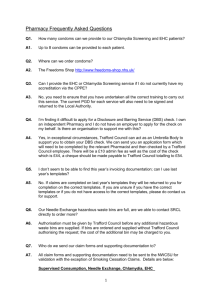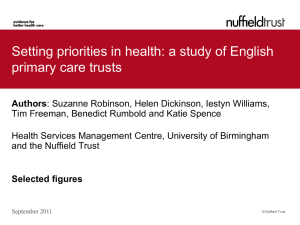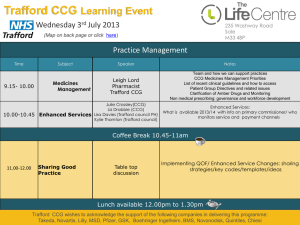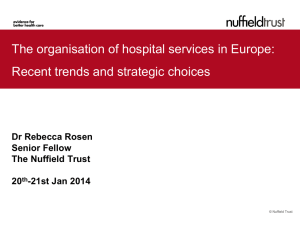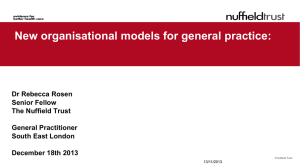Integrated care in Trafford: progress to date
advertisement
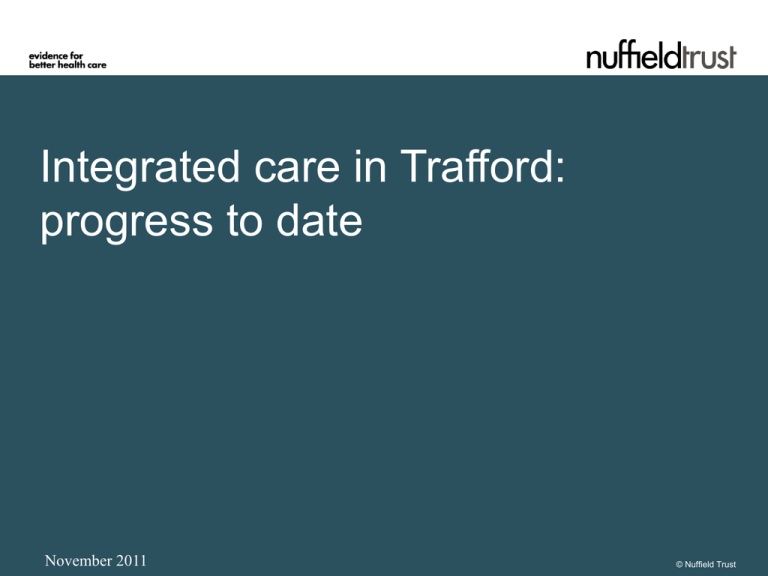
Integrated care in Trafford: progress to date November 2011 © Nuffield Trust The Trafford integration story • Working for > 3 years to develop integrated care • Rising demand: older population, long-term conditions • Financial issues create a ‘burning platform’ • Sept. 2008: ‘Clinical Congress’, to engage with care professionals • 2008–10: strategic development/SHA rejects plans • Focus on developing integrated service system • 2011: on-going development of a community-based ICO © Nuffield Trust Principles used to guide the development of an integrated care system for Trafford 1. ‘Nothing about me, without me’ – the patient voice must be at the heart of all provision 2. General practice should be the ‘locus of integrated services’ 3. Specialist expertise is an essential component of effective integrated services 4. The delivery of integrated services will rest primarily on extended roles for nurses and AHPs 5. Integrated services must incorporate social care 6. Future integrated services should bring together the full range of primary care services © Nuffield Trust Overview of Trafford’s integrated governance arrangements Overview of the emerging integrated care organisation in Trafford Putting patients at the heart of integrated services in Trafford Six mechanisms for engaging patients and the public in integrating care in Trafford 1. Assessing public/patient opinion 2. Developing Patient Congress events 3. Recruitment of patient representatives 4. Developing a programme of accessible community engagement events 5. Supporting the establishment of GP-attached patient forums 6. Tracking patient experiences © Nuffield Trust Key clinical engagement activities in Trafford • Engaging clinicians in developing integrated care • Leading service redesign • Developing local clinical leaders • Engaging vanguard (early adopter) practices © Nuffield Trust Designing integrated services • Six multidisciplinary clinical panels selected in April 2010: • Clinical services (diabetes; respiratory; mental health and learning disability; ear, nose and throat) • 'Whole system’ areas (unscheduled and end-of-life care) • Bringing together consultants, GPs, specialist nurses/AHPs and social care staff • Supported by patient representatives, project managers and facilitators • Underpinned by quality improvement methodologies © Nuffield Trust Overview of the work of the diabetes clinical panel Plans for closer working across health and social care in Trafford • Continue to work with adult social services • Develop a formal joint partnership • Sustain the benefits of an integrated ‘virtual’ organisation • Align work on telehealth • Work with the evolving local authority public health team • Contribute to the work of wider stakeholders © Nuffield Trust Overview of data sharing arrangements Integration challenges in Trafford 1. Recognise that major change is needed 2. Put patients at the centre 3. Engage with stakeholders when developing integrated systems 4. Facilitate effective local leadership 5. Focusing on improving quality and efficiency © Nuffield Trust Lessons from Trafford’s integration journey • Ensure a clear and agreed vision • Work simultaneously with commissioners and service providers • Make a clear case for change and the journey towards integration • Be realistic about the pace of change • Ensure high-level support for integration • Secure senior staff time to ensure effective and ongoing engagement © Nuffield Trust Lessons from Trafford’s integration journey • Actively engage clinicians across primary and secondary care • Make integrated care attractive to all clinicians • Ensure space and time to build a relationship • Engage social services from the outset • Use appropriate language © Nuffield Trust Lessons from Trafford’s integration journey • Acknowledge the integral role of existing and emerging boards • Promote integrated care thinking amongst senior executives • Actively develop and support local leaders • Be clear about the role and activities of each of the stakeholders within an integrated care system • Use data systems, intelligence and information sharing to deliver integration • Use technology effectively © Nuffield Trust www.nuffieldtrust.org.uk Sign-up for our newsletter www.nuffieldtrust.org.uk/newsletter Follow us on Twitter http://twitter.com/NuffieldTrust November 2011 © Nuffield Trust

